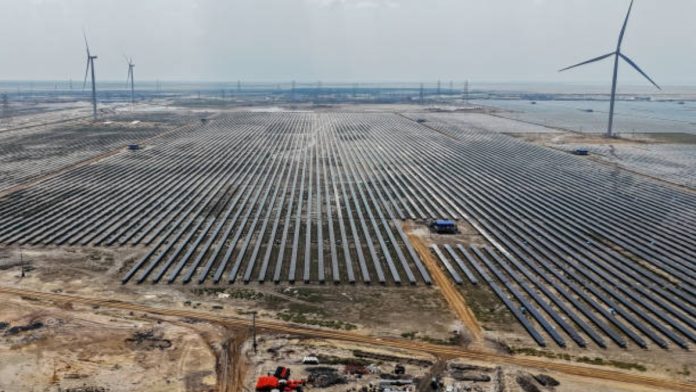India’s renewable energy RE) ambitions could increase the country’s annual solar import bill to $ 30 billion from $ 7 billion currently with most of it coming from China and as the entire world faces the same issue in its efforts to decarbonise key countries need to unite to global scale solar manufacturing facilities, according to a report by Global Trade Research Initiative.
To meet its goal of 500 GW of renewable energy by 2030 India needs to add 65 to 70 GW each year. This target is ambitious considering that 15 GW of solar capacity in 2023-24 and the US plans to add 32 GW in 2024.
For the solar capacity addition last financial year India imported $ 7 billion worth of solar equipment with China supplying 62.6% of it. China controls 97% of global polysilicon and 80% of solar module manufacturing making it difficult for any country to compete due to lower prices from China. Complete dominance by China that keeps the market oversupplied, putting pressure on manufacturing efforts of countries like India and US.
Also Read Haryana’s new BJP government set to take oath on October 17, PM Modi to attend ceremony AAI, Madhya Pradesh govt sign MoU to expand Shivpuri Airport, aims to transform it into ‘key regional hub’ AMPIN Energy aims to add 25 GW of RE capacity by 2030 10-year g-sec yield slumps to 32-month low
“The US, India, EU and Japan may unite to establish global scale solar-cell manufacturing facilities. While it may be costly initially, it is essential to break free from China’s dominance,” GGTRI co-founder and author of the report ‘Global Solar Industry in China’s Iron Grip’ Ajay Srivastava said
While initiatives like the Production Linked Incentive (PLI) scheme aim to boost local manufacturing, its impact is limited as it relies on imported inputs. Around 90% of solar manufacturing in India involves assembling solar modules from solar cells with 15% value addition. Very few Indian companies produce commercial scale solar cells from imported polysilicon or wafers that adds 30-40% value locally.
Developing a self-reliant solar manufacturing industry in India will require significant investment to create an integrated supply chain especially in areas like polysilicon and wafer production. Without it India may continue to face high import costs and struggle to meet its renewable energy goals.
» Read More


